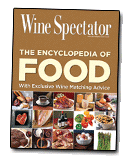 I can't put down Wine Spectator's current issue, "The Encyclopedia of FOOD With Exclusive Wine Matching Advice" (dated Sept. 30). I first saw it when I was in Seattle, and I kept meaning to pick it up. I was afraid I was already too late, but I just snatched up Adel's last copy. There are probably still more of these floating around out there, and I definitely think it's worth hunting down for anyone who relishes good food and wine. Beyond the usual wine pairings and recipes, there's a practical reference section on different meats, produce, dairy, bread, oil & vinegar, coffee & tea, and even chocolate! Food, wine, chocolate - all in one place! Pure bliss.
I can't put down Wine Spectator's current issue, "The Encyclopedia of FOOD With Exclusive Wine Matching Advice" (dated Sept. 30). I first saw it when I was in Seattle, and I kept meaning to pick it up. I was afraid I was already too late, but I just snatched up Adel's last copy. There are probably still more of these floating around out there, and I definitely think it's worth hunting down for anyone who relishes good food and wine. Beyond the usual wine pairings and recipes, there's a practical reference section on different meats, produce, dairy, bread, oil & vinegar, coffee & tea, and even chocolate! Food, wine, chocolate - all in one place! Pure bliss.Do you know how to carve poultry and fillet a fish? There are pictured instructions (including both round and flat fish). Do you have a hard time keeping track of when certain produce is in season? There's an easy-to-read chart of fruit and vegetables on page 116. Here are just a few more notes of interest.
Are you weary of fish that can be harmful to your health? There's a list of "Fish to Buy" and "Fish to Avoid" with a reference to Environmental Defense's Oceans Alive. A few that are noted as potentially harmful are: Grouper, Mackerel (Spanish), Marlin, Orange Roughy, Rockfish (from the Pacific - rock cod, bocaccio), Salmon (from the Atlantic), Tuna (bluefin).
Do you know how to determine the freshness of an egg? "Crack one open on a plate. If the egg is not very fresh, the white part will spread out, and the yolk will be flat." Also, they point out that eggs should be stored in their original container in the coldest part of the 'fridge, not on the door.
Did you know you can make your own vinegar? "Stop pouring leftover wine down the sink - you can make it into vinegar. Simply pour a cup of non-pasteurized red wine vinegar into a half-empty bottle of red wine. Cork it, shake it up, and then just let it sit. Uncork the bottle for a few hours every other day. Start tasting it after two weeks. Within a month, you should have a tart and very winy vinegar... Run all the liquid through a coffee filter and store it in a clean bottle."
Did you know that there's a difference between scallions and green onions? "Scallions are milder than green onions. Green onions are immature onions that curve slightly due to the growing bulb at the end." I was just talking to Lee about the recipe for the steamed sea bass I made, and she commented, "You say green onions instead of scallions?" We both thought they were two different names for same thing. But now we know. And knowing's half the battle.
2 comments:
thanks for the info - now i know what to do with that leftover red wine (not that there's often much)....
Hmmm...I must get this book. What a plethora of foody information!
Post a Comment